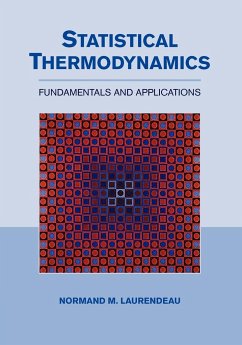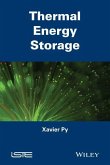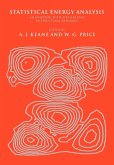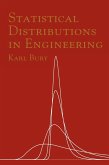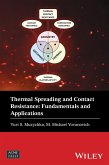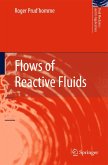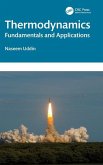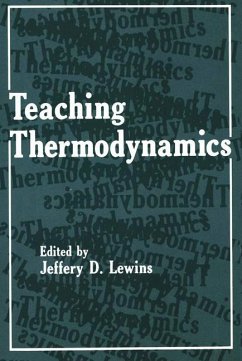- Broschiertes Buch
- Merkliste
- Auf die Merkliste
- Bewerten Bewerten
- Teilen
- Produkt teilen
- Produkterinnerung
- Produkterinnerung
This 2006 textbook discusses the fundamentals and applications of statistical thermodynamics for beginning graduate students in engineering and the physical sciences.
Andere Kunden interessierten sich auch für
![Thermal Energy Storage Thermal Energy Storage]() Xavier PyThermal Energy Storage172,99 €
Xavier PyThermal Energy Storage172,99 €![Statistical Energy Analysis Statistical Energy Analysis]() A. J. Keane / W. G. Price (eds.)Statistical Energy Analysis61,99 €
A. J. Keane / W. G. Price (eds.)Statistical Energy Analysis61,99 €![Statistical Distributions in Engineering Statistical Distributions in Engineering]() Karl BuryStatistical Distributions in Engineering245,99 €
Karl BuryStatistical Distributions in Engineering245,99 €![Thermal Spreading and Contact Resistance Thermal Spreading and Contact Resistance]() Yuri S. MuzychkaThermal Spreading and Contact Resistance146,99 €
Yuri S. MuzychkaThermal Spreading and Contact Resistance146,99 €![Flows of Reactive Fluids Flows of Reactive Fluids]() Roger Prud'hommeFlows of Reactive Fluids112,99 €
Roger Prud'hommeFlows of Reactive Fluids112,99 €![Thermodynamics Thermodynamics]() Naseem UddinThermodynamics177,99 €
Naseem UddinThermodynamics177,99 €![Teaching Thermodynamics Teaching Thermodynamics]() Jeffrey D. LewinsTeaching Thermodynamics41,99 €
Jeffrey D. LewinsTeaching Thermodynamics41,99 €-
-
-
This 2006 textbook discusses the fundamentals and applications of statistical thermodynamics for beginning graduate students in engineering and the physical sciences.
Hinweis: Dieser Artikel kann nur an eine deutsche Lieferadresse ausgeliefert werden.
Hinweis: Dieser Artikel kann nur an eine deutsche Lieferadresse ausgeliefert werden.
Produktdetails
- Produktdetails
- Verlag: Cambridge University Press
- Seitenzahl: 466
- Erscheinungstermin: 1. Dezember 2010
- Englisch
- Abmessung: 254mm x 178mm x 25mm
- Gewicht: 869g
- ISBN-13: 9780521154192
- ISBN-10: 0521154197
- Artikelnr.: 32733744
- Herstellerkennzeichnung
- Libri GmbH
- Europaallee 1
- 36244 Bad Hersfeld
- gpsr@libri.de
- Verlag: Cambridge University Press
- Seitenzahl: 466
- Erscheinungstermin: 1. Dezember 2010
- Englisch
- Abmessung: 254mm x 178mm x 25mm
- Gewicht: 869g
- ISBN-13: 9780521154192
- ISBN-10: 0521154197
- Artikelnr.: 32733744
- Herstellerkennzeichnung
- Libri GmbH
- Europaallee 1
- 36244 Bad Hersfeld
- gpsr@libri.de
Normand M. Laurendeau is the Ralph and Bettye Bailey Professor of Combustion at Purdue University. He teaches at both the undergraduate and graduate levels in the areas of thermodynamics, combustion and engineering ethics. He conducts research in the combustion sciences, with particular emphasis on laser diagnostics, pollutant formation and flame structure. Dr Laurendeau is well known for his pioneering research on the development and application of both nanosecond and picosecond laser-induced fluorescence strategies to quantitative species concentration measurements in laminar and turbulent flames. He has authored or coauthored over 150 publications in the archival scientific and engineering literature. Professor Laurendeau is a Fellow of the American Society of Mechanical Engineers and a member of the Editorial Advisory Board for the peer-reviewed journal Combustion Science and Technology.
Preface
1. Introduction
Part I. Fundamentals of Statistical Thermodynamics: 2. Probability and statistics
Problem set I. Probability theory and statistical mathematics
3. The statistics of independent particles
4. Thermodynamics properties in the dilute limit
Problem set II. Statistical modeling for thermodynamics
Part II. Quantum Mechanics and Spectroscopy: 5. Basics of quantum mechanics
6. Quantum analysis of internal energy modes
7. The spectroscopy of diatomic molecules
Problem set III. Quantum mechanics and spectroscopy
Part III. Statistical Thermodynamics in the Dilute Limit: 8. Interlude: from particle to assembly
9. Thermodynamic properties of the ideal gas
Problem set IV. Thermodynamic properties of the ideal gas
10. Statistical thermodynamics for ideal gas mixtures
11. Concentration and temperature measurements
Problem set V. Chemical equilibrium and diagnostics
Part IV. Statistical Thermodynamics beyond the Dilute Limit: 12. Thermodynamics and information
13. Elements of the solid state
14. Equilibrium radiation
Problem set VI. The solid state and radiation
Part V. Non-Equilibrium Statistical Thermodynamics: 15. Elementary kinetic theory
16. Kinetics of molecular transport
17. Chemical kinetics
Problem set VII. Kinetic theory and molecular transport
Part VI. The Ensemble Method of Statistical Thermodynamics: 18. The canonical and grand canonical ensembles
19. Applications of ensemble theory to real gases
Problem set VIII. Ensemble theory and the non-ideal gas
20. Whence and whither
Part VII. Appendices
Index.
1. Introduction
Part I. Fundamentals of Statistical Thermodynamics: 2. Probability and statistics
Problem set I. Probability theory and statistical mathematics
3. The statistics of independent particles
4. Thermodynamics properties in the dilute limit
Problem set II. Statistical modeling for thermodynamics
Part II. Quantum Mechanics and Spectroscopy: 5. Basics of quantum mechanics
6. Quantum analysis of internal energy modes
7. The spectroscopy of diatomic molecules
Problem set III. Quantum mechanics and spectroscopy
Part III. Statistical Thermodynamics in the Dilute Limit: 8. Interlude: from particle to assembly
9. Thermodynamic properties of the ideal gas
Problem set IV. Thermodynamic properties of the ideal gas
10. Statistical thermodynamics for ideal gas mixtures
11. Concentration and temperature measurements
Problem set V. Chemical equilibrium and diagnostics
Part IV. Statistical Thermodynamics beyond the Dilute Limit: 12. Thermodynamics and information
13. Elements of the solid state
14. Equilibrium radiation
Problem set VI. The solid state and radiation
Part V. Non-Equilibrium Statistical Thermodynamics: 15. Elementary kinetic theory
16. Kinetics of molecular transport
17. Chemical kinetics
Problem set VII. Kinetic theory and molecular transport
Part VI. The Ensemble Method of Statistical Thermodynamics: 18. The canonical and grand canonical ensembles
19. Applications of ensemble theory to real gases
Problem set VIII. Ensemble theory and the non-ideal gas
20. Whence and whither
Part VII. Appendices
Index.
Preface
1. Introduction
Part I. Fundamentals of Statistical Thermodynamics: 2. Probability and statistics
Problem set I. Probability theory and statistical mathematics
3. The statistics of independent particles
4. Thermodynamics properties in the dilute limit
Problem set II. Statistical modeling for thermodynamics
Part II. Quantum Mechanics and Spectroscopy: 5. Basics of quantum mechanics
6. Quantum analysis of internal energy modes
7. The spectroscopy of diatomic molecules
Problem set III. Quantum mechanics and spectroscopy
Part III. Statistical Thermodynamics in the Dilute Limit: 8. Interlude: from particle to assembly
9. Thermodynamic properties of the ideal gas
Problem set IV. Thermodynamic properties of the ideal gas
10. Statistical thermodynamics for ideal gas mixtures
11. Concentration and temperature measurements
Problem set V. Chemical equilibrium and diagnostics
Part IV. Statistical Thermodynamics beyond the Dilute Limit: 12. Thermodynamics and information
13. Elements of the solid state
14. Equilibrium radiation
Problem set VI. The solid state and radiation
Part V. Non-Equilibrium Statistical Thermodynamics: 15. Elementary kinetic theory
16. Kinetics of molecular transport
17. Chemical kinetics
Problem set VII. Kinetic theory and molecular transport
Part VI. The Ensemble Method of Statistical Thermodynamics: 18. The canonical and grand canonical ensembles
19. Applications of ensemble theory to real gases
Problem set VIII. Ensemble theory and the non-ideal gas
20. Whence and whither
Part VII. Appendices
Index.
1. Introduction
Part I. Fundamentals of Statistical Thermodynamics: 2. Probability and statistics
Problem set I. Probability theory and statistical mathematics
3. The statistics of independent particles
4. Thermodynamics properties in the dilute limit
Problem set II. Statistical modeling for thermodynamics
Part II. Quantum Mechanics and Spectroscopy: 5. Basics of quantum mechanics
6. Quantum analysis of internal energy modes
7. The spectroscopy of diatomic molecules
Problem set III. Quantum mechanics and spectroscopy
Part III. Statistical Thermodynamics in the Dilute Limit: 8. Interlude: from particle to assembly
9. Thermodynamic properties of the ideal gas
Problem set IV. Thermodynamic properties of the ideal gas
10. Statistical thermodynamics for ideal gas mixtures
11. Concentration and temperature measurements
Problem set V. Chemical equilibrium and diagnostics
Part IV. Statistical Thermodynamics beyond the Dilute Limit: 12. Thermodynamics and information
13. Elements of the solid state
14. Equilibrium radiation
Problem set VI. The solid state and radiation
Part V. Non-Equilibrium Statistical Thermodynamics: 15. Elementary kinetic theory
16. Kinetics of molecular transport
17. Chemical kinetics
Problem set VII. Kinetic theory and molecular transport
Part VI. The Ensemble Method of Statistical Thermodynamics: 18. The canonical and grand canonical ensembles
19. Applications of ensemble theory to real gases
Problem set VIII. Ensemble theory and the non-ideal gas
20. Whence and whither
Part VII. Appendices
Index.

